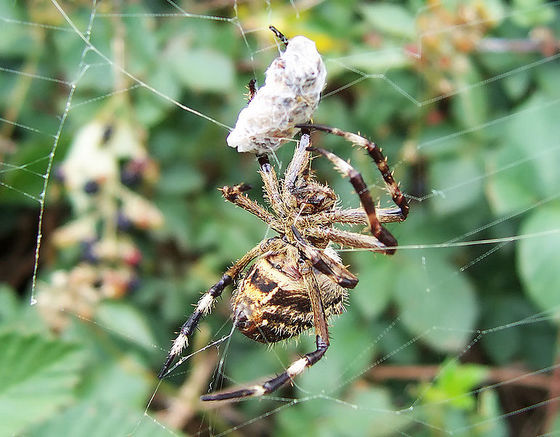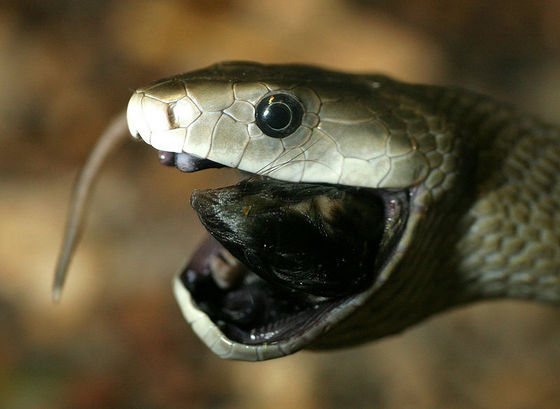This piece was an invited reply for the electronic journal Pensata Animal to the question of whether we should interfere with natural predation.
Translations: Spanish, French (.html or .pdf)
I begin with a quote from River Out of Eden by Richard Dawkins (pp. 131-32):
The total amount of suffering per year in the natural world is beyond all decent contemplation. During the minute it takes me to compose this sentence, thousands of animals are being eaten alive; others are running for their lives, whimpering with fear; others are being slowly devoured from within by rasping parasites; thousands of all kinds are dying of starvation, thirst and disease. [...] In a universe of blind physical forces and genetic replication, some people are going to get hurt, other people are going to get lucky, and you won't find any rhyme or reason in it, nor any justice. The universe we observe has precisely the properties we should expect if there is, at bottom, no design, no purpose, no evil and no good, nothing but blind, pitiless indifference.
Evolution optimizes for reproductive success rather than individual well-being. The result, as economist Yew-Kwang Ng argues in his "Towards Welfare Biology: Evolutionary Economics of Animal Consciousness and Suffering," is a world in which most species have far more offspring than will survive to maturity (sometimes laying thousands or millions of eggs per season).

And even for the survivors, life involves a constant struggle to find enough food, avoid predators, and overcome sickness and injury for a few brief years (or months) before death comes at the jaws of a predator or the grip of a parasite. Pain is a powerful motivational tool, and evolution has no qualms about using it to maximum effect.
The human species finds itself in a rare position among life on earth and perhaps in the cosmos more broadly. First, we experience the emotional ups and downs, pains and pleasures that accompany sentient animal life generally. We too are byproducts of evolution.
Secondly, humans have a capacity for empathy—for modeling the cognitive and emotional states of other organisms and then responding as though we were experiencing those thoughts and feelings ourselves. While this trait is shared by other species, it does not appear to be an inevitable result of the evolutionary process and is probably quite rare among life throughout the universe. (It seems that more advanced intelligences could better separate their "intentional stance" modeling systems from their self-preservation and motivation systems, so that understanding what another agent will do wouldn't bleed over into caring about how that agent feels as it does for humans.a)
Finally, unlike other empathetic species, humans have (or are in the process of developing) the technological tools not just, e.g., to acquire food and fight off enemies, but also directly to challenge the evolutionary process itself. This may, one day, include the ability to modify the neural substrates of emotion to reduce the badness of suffering, perhaps replacing its motivational function with what philosopher David Pearce has called "gradients of well-being". Even if this is not possible, humans can at least pay attention to and calculate the implications of their choices—regarding environmental changes on earth and, speculatively, the dispersion of sentient life to other planets—on the amount of Darwinian suffering (and happiness) that will be experienced by the individual organisms so affected.
I think we have an obligation to exercise our rare position in the history of life to do the best we can in replacing the consequences of evolution's singular focus on reproductive survival of species with a humane approach that values instead the emotions of individual sentient organisms.

This will mean, at some point, changing the natural world in order to reduce the suffering that so many of its inhabitants now endure on a daily basis. That said, if humans are to succeed in helping wildlife in a significant way, we need to take a fundamental approach, one that will require much greater knowledge and technological capacity than we have at the moment.
What does all of this this imply for animal activists? I think the most important thing we can do is to promote the idea that wild-animal suffering matters and is a serious ethical issue. Cancer, malaria, sexual violence, and depression are all "natural" outcomes of evolution's optimization process, yet we rightly consider them evils to be resisted; we should encourage people to realize that the cruelties that nature inflicts on its nonhuman inhabitants are just as ethically intolerable—indeed more so, since the number of organisms affected in the latter case is orders of magnitude higher. By writing articles and forum posts, talking with activists and philosophers, and holding public conversations, we animal advocates can help make wild animals a significant moral priority guiding technological innovation—as well as ensuring that their pleasures and pains are considered seriously before humans undertake actions that might vastly increase the number of them that exist. I think that failing to act to help our fellow creatures in the wild would be an abdication of a special opportunity that we humans have to replace the "blind, pitiless indifference" of nature with the best that our empathy has to offer.
I end with a quote from this article, which was pointed out to me by Lara André:
John Armstrong, a British writer, and philosopher at The School Of Life, sees a gulf between human aspiration for justice and ethics and the laws of nature. Often we feel that something that is "evil" is against the natural order of things, or, as Armstrong put it, "at odds with everything one might hope for".
But perhaps the opposite is actually true: it is "bad" behaviour that is natural and successful. "What's surprising is how amazingly well (though still very imperfectly) human beings have tried to reverse this natural arrangement," he says.
- This point was inspired by Carl Shulman. (back)